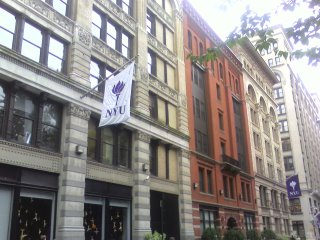Official Class List for Fall 2006

Having never gone to grad school before, I was ignorant about how many classes to take. As an undergrad, I'd always taken several classes above the official full-time load. I thought that I might do the same thing here until already Ph.D-festooned friends and former professors began looking at me as if I'd sprouted a third eye when I brought it up. When they found out that each of my classes were four credit hours apiece and that I'd also be working part-time while attending school, they were very emphatic that I take it easy. Turns out NYU won't even let me go above normal full-time without special dispensation. So, three courses it is then.
Two of the courses offered each of the first two semesters are part of a larger set of four courses required of the overall program. So you take them when they are offered. This leaves only one elective per the first two semesters to choose from. Something I did find out last night at my orientation is that the program, while realistically two years, is, in fact, only three technical semesters. Bad for people who wish to immerse themselves in as many (elective) classes as possible, but good for their pocketbooks.
This semester's required courses are "Film Form and Film Sense" and "Film History and Historography." Why is it that required courses always have such boring and uninspired names? Not that the classes are boring, necessarily, but is it too much to ask for a little zip and zing when deciding what to call them? My elective for Fall 2006 is "Screenwriting and Narrative Analysis."
Their descriptions (included for those of you who were begging for the minute details) are as follows:
Film Form and Film Sense: "The purpose of this course is to introduce students to central concepts in film form and style as well as film narrative. The course is structured to suggest a constant but expanding series of models for textual analysis of audio-visual works, with emphasis on the "cinematic signifier." The course will also deal with issues of the interpretation of audio-visual works, in relation to textual analysis. Part One of the course will have a strong formal emphasis: introducing concepts such as shot-structure, editing, mise-en-scene, camera movement and sound in relation to their function in the structuring of film narrative. Part Two will formulate these concepts more thoroughly in terms of parameters of film narrative (e.g. focalization and its implications for the representation of gender and race). Parts Three and Four will further expand the conceptualization of these issues by dealing with the relationship of film narrative to: 1) genre, understood in terms of its social and ideological implications; and 2) cultural history, understood in terms of the social relations between cultural discourses and the specificity of film narrative."
Film History and Historiography: "This introductory lecture will engage a number of cultural, aesthetic, as well as methodological issues in current historical film scholarship: the constitution of the codes and institutions of cinema and the ways in which the history of film has been, and has been understood to be, embedded in, shaped, and constrained by material and social practices. Various historiographical methods and historical contexts will be explored. Topics: screen practices, narrative integration (and its alternatives), spectatorship, cultural translation and more."
Screenwriting and Narrative Analysis: "This course centers around the exploration of storytelling approaches in feature films from the practical perspective of the writer. We will examine a broad range of narrative strategies and dramatic writing tools, from traditional three-act structure to radically alternative approaches. We will concentrate exclusively on the story elements and techniques which are within the domain of the screenplay and scriptwriter. Students will have a choice of writing analytical papers or trying their hand at scriptwriting."
Anyone still think all we Cinema Studies students do is hang out and watch movies!?
(After locking in my classes, I made the dreaded trek to spend the necessary life's savings in what is easily one of life's great scams--purchasing college text books. To my utter astonishment, I only had to get a half dozen books and none of those were anywhere close to a hundred dollars. A quick check on Amazon confirmed that, at least for this semester, at this school, I am buying fewer book and paying a lot less money. Go to grad school. Save money--at least on books, that is. Who knew?)


5 Comments:
I'm most interested in that last course. I am always curious what dramatic shortcut devices are being used on me when I watch something. Sometimes I have an intuitive sense for it, but just as many times I didn't even realize what it was until it was pointed out to me. Joss Whedon's commentaries are always very illuminating in this regard.
Bah! Save money on books? Ridiculous I say! ...ok granted the last couple of semesters Ive been taking 4 classes and not 3, but still.....just wait take a class on Film Theory that'll do it....at least it did here: 13 required textbooks and 12 more 'strongly recommended' and that was just that one class....
You're first two courses sound like they should be pretty easy for you. Its not like Robert didnt incorporate all that stuff all the time.
The question is...are you going to write an analytical paper or a screenplay?
Oh, definetly a screenplay!
Had your fill of Analysis, have you?
Get it? Analysis? Get it?
I am awesome.
Ah, Navy humor. On par with potty humor.
Post a Comment
<< Home